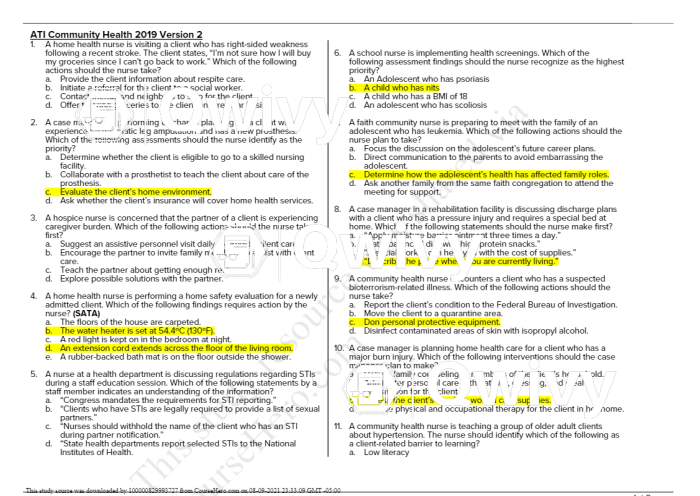The ATI RN Community Health 2019 Proctored Exam Version 1 is a crucial assessment for nurses seeking to demonstrate their knowledge and skills in community health nursing. This guide provides an in-depth overview of the exam, including its structure, content, preparation strategies, exam-taking techniques, and scoring and interpretation.
Understanding the ATI RN Community Health 2019 Proctored Exam Version 1 is essential for nurses who want to advance their careers in community health nursing. This guide will equip nurses with the necessary information to prepare effectively and achieve success on the exam.
ATI RN Community Health 2019 Proctored Exam Version 1 Overview
The ATI RN Community Health 2019 Proctored Exam Version 1 is a standardized assessment designed to evaluate the knowledge and skills of registered nurses in community health nursing. It is an important tool for nurses seeking certification in community health and for those looking to demonstrate their competence in this specialized field.The
exam has a rich history and has undergone several revisions over the years to ensure it remains current with the latest advances in community health nursing practice. It is administered by Assessment Technologies Institute (ATI), a leading provider of assessment and educational resources for healthcare professionals.To
be eligible to take the exam, candidates must be registered nurses with a current and active RN license. They should also have at least one year of experience in community health nursing or a related field.
Exam Structure and Content

The ATI RN Community Health 2019 Proctored Exam Version 1 consists of 150 multiple-choice questions that must be completed within a three-hour time limit. The exam covers a wide range of topics related to community health nursing, including:
- Community assessment and diagnosis
- Health promotion and disease prevention
- Family and community health
- Environmental health
- Cultural and ethical considerations in community health nursing
The exam also includes questions on professional roles and responsibilities, as well as research and evidence-based practice in community health nursing.
Preparation Strategies
To prepare effectively for the ATI RN Community Health 2019 Proctored Exam Version 1, it is essential to:
- Understand the exam blueprint and familiarize yourself with the content areas covered
- Study using high-quality resources, such as textbooks, online courses, and practice exams
- Practice answering multiple-choice questions and develop effective test-taking strategies
- Manage your time wisely during the exam and allocate time appropriately to each question
- Stay calm and focused throughout the exam and avoid becoming overwhelmed
Exam-Taking Techniques
To maximize your performance on the ATI RN Community Health 2019 Proctored Exam Version 1, employ the following techniques:
- Read each question carefully and identify the key information
- Eliminate incorrect answer choices by carefully considering the question and the options provided
- Use the process of elimination to narrow down your choices and select the best answer
- Pay attention to the wording of the questions and avoid making assumptions
- If you are unsure about an answer, mark it for review and come back to it later
FAQ Section
What is the purpose of the ATI RN Community Health 2019 Proctored Exam Version 1?
The ATI RN Community Health 2019 Proctored Exam Version 1 is designed to assess nurses’ knowledge and skills in community health nursing, including health promotion, disease prevention, and community assessment.
Who is eligible to take the ATI RN Community Health 2019 Proctored Exam Version 1?
Registered nurses who have completed an accredited nursing program and have a current RN license are eligible to take the exam.
How do I prepare for the ATI RN Community Health 2019 Proctored Exam Version 1?
Effective preparation strategies include studying the exam blueprint, practicing with sample questions, and seeking support from study groups or online resources.